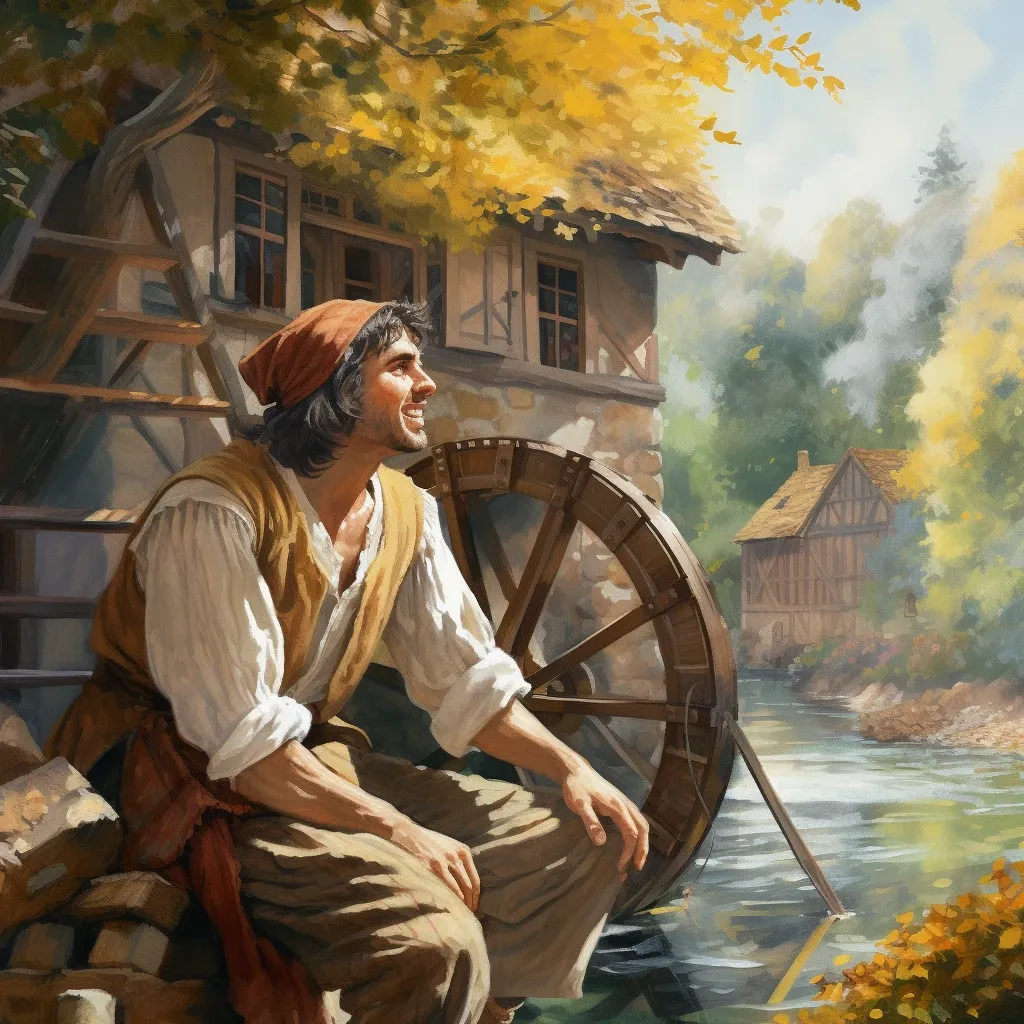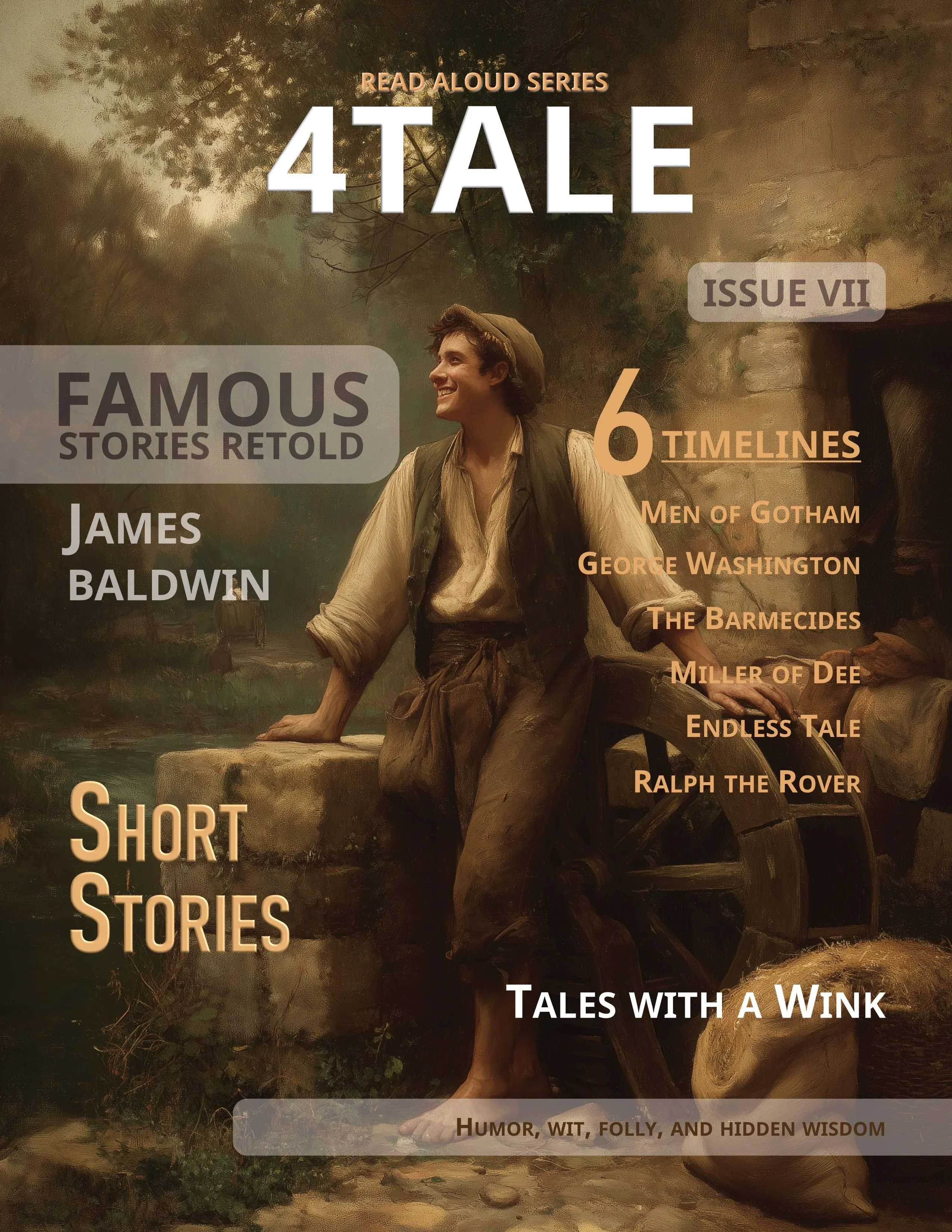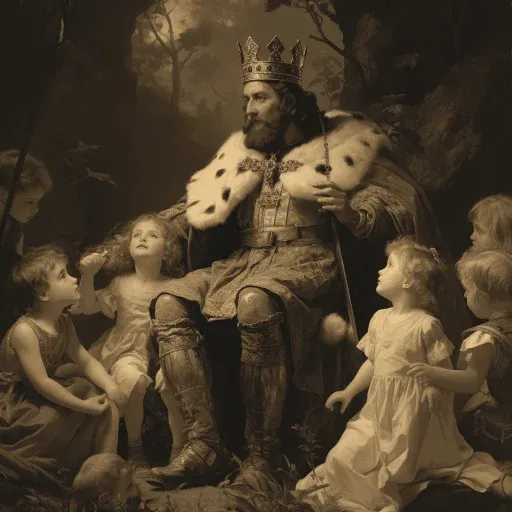BY JAMES BALDWIN
The Miller of the Dee
Famous Stories Retold: Story 12 of 50

Heading

Contentment: The miller was known for his contentment and happiness, living a simple life by the River Dee.
Wisdom: The miller’s wisdom lay in his simplicity, self-sufficiency, and appreciation for what he had, rather than longing for more.
A good book we like, we explorers. That is our best amusement, and our best time killer
- Roald Amundsen, Explorer
Finding Joy in Simplicity: The Story of the Dee Miller
In the heart of England, nestled along the River Dee, resided a humble miller known to be the happiest man in the country. His merry disposition and simple, content life intrigued people far and wide, even reaching the ears of the king himself. But what was the secret of this miller's unending happiness? Prepare to delve into his life and discover the profound truths hidden within his daily routine, as we explore the captivating tale of the Miller of the Dee. By the end of this story, the essence of true happiness may well be uncovered, altering your perspective on life forever.
The Miller of the Dee: An Introduction
Once upon a time, along the picturesque banks of the River Dee, a miller resided whose happiness was the talk of the land. His natural cheerfulness and perpetual merry songs turned the mill into a beacon of joy. Constantly occupied from dawn till dusk, he found his bliss in his labor, his family and his independence. His contagious happiness spread far and wide, reaching the royal court and intriguing the king himself.
The King's Curiosity: The Quest for Happiness
Intrigued by tales of the miller's unbridled joy, the king decided to visit him. His own royal life, filled with responsibilities and worries, often left him longing for genuine happiness. "Perhaps," thought he, "this miller, with his simple life and endless cheer, could teach me to find my joy." Thus, he set out for the mill, his heart heavy with hope and curiosity.
Podcast
The Song of Contentment: The Miller's Philosophy
Upon the king's arrival at the mill, he was greeted by the miller's merry song, an ode to contentment and satisfaction. The miller's words echoed through the mill's stone walls, "I envy nobody—no, not I—For I am as happy as I can be; And nobody envies me." This was a reflection of the miller's philosophy of life—finding happiness in one’s own circumstances and not envying others. This philosophy intrigued the king, leading to an exchange that would change his perspective on joy and contentment.
The Exchange: The King and the Miller
As the story unfolds, the king and the miller engage in a remarkable exchange. The king, burdened by his royal responsibilities and the constant worry that accompanies his position, expresses his envy towards the miller. The miller's lighthearted attitude and unwavering happiness left the king yearning for a similar experience. Despite the king's wealth and power, he found himself longing for the simple joy that the miller's life seemed to embody.
The miller, on the other hand, couldn't comprehend the king's desire to exchange places. His life, involved with the simple pleasures of love, friendship, and hard work, was perfect in his eyes. He worked for his sustenance, enjoyed the love of his family, and was free of debt. These facets of his life were the source of his happiness.

The Miller's Secret: The Source of His Joy
The secret to the miller's joy was not hidden in wealth or power, but rather in the simplicity of his life. The miller found happiness in the purest, most essential parts of life. He took great joy in his work, which allowed him to provide for his loved ones. His love for his wife and children brought him immense happiness, as did the love and respect he received from his friends.
In addition to this, the miller was free of debt, a freedom that allowed him to live without financial worry. His days were filled with song and cheerfulness, a testament to the joy he found in his life by the River Dee. His happiness was a product of his contentment with his life, a lesson that the king, despite his wealth and power, was yet to learn.
The King's Realization: A Lesson in Contentment
Upon realizing the source of the miller's happiness, the king was left in awe. He realized that true happiness does not lie in wealth, power, or status, but in contentment with what one has. The miller's dusty cap and his humble mill brought him more joy than the king's golden crown or his vast kingdom.
The king, in his quest for happiness, took home a vital lesson from the miller. The importance of contentment, of cherishing the love of family, the satisfaction of hard work, and the freedom of a debt-free life. This realization marked a significant change in the king's perspective, teaching him the true value of happiness and contentment. The miller’s story serves as a timeless reminder to us all that true joy emanates not from riches or status, but from a heart that is content.
Conclusion
In the tale of the Miller of the Dee, we discover that true happiness isn't found in power or wealth, but in contentment and simplicity. The miller's joy in his work, love for his family, and freedom from debt highlight the essence of a truly happy life. This profound realization offers a refreshing perspective on our own pursuits of happiness. Perhaps, like the king, we too can learn from the miller's humble wisdom. As we navigate the complexities of life, let us remember the miller's song of contentment echoing by the River Dee, a timeless reminder of the secret to genuine happiness.





